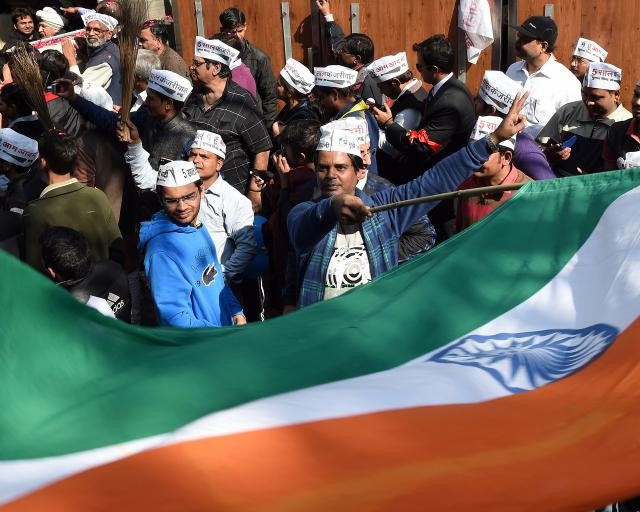 The honeymoon period for India's ruling Bharatiya Janata Party, or BJP, is over. The opposition Aam Aadmi Party, or AAP, delivered it one of the worst electoral defeats in BJP history in Delhi's Feb. 7 local elections, winning 67 of 70 seats. Many Indian political analysts interpreted the defeat as a referendum on Prime Minister Narendra Modi and the BJP's stewardship of the economy.
The honeymoon period for India's ruling Bharatiya Janata Party, or BJP, is over. The opposition Aam Aadmi Party, or AAP, delivered it one of the worst electoral defeats in BJP history in Delhi's Feb. 7 local elections, winning 67 of 70 seats. Many Indian political analysts interpreted the defeat as a referendum on Prime Minister Narendra Modi and the BJP's stewardship of the economy.
Though a BJP spokesperson labeled the results a "small loss, but a big lesson," the Delhi elections will likely mark the end of the popular momentum behind Modi and the BJP following its victory in May's national parliamentary elections. The BJP will likely acknowledge and try to fix the party's internal problems, but it will nonetheless face opposition in implementing large-scale economic reform to return India to sustained levels of growth.
The Indian National Congress controlled the Delhi legislative assembly for 15 years until losing elections to the BJP and AAP in 2013. Though the BJP won a plurality of seats — seen by some political observers as a harbinger of national elections in 2014 — the party was unable to form a government. The AAP, led by Arvind Kejriwal, took control of the legislature with support from the Congress party.
Subsequently, the AAP embarked on a controversial and ambitious reform initiative to improve the lives of Delhi's poorest citizens by rolling back rampant corruption and bureaucratic oversight. The heart of this reform package was the Jan Lokpal, or Citizen's Ombudsman Bill, which would have set up an independent review process to investigate corruption cases. However, the AAP's failure to pass the Jan Lokpal Bill forced Kejriwal to resign from his post, and so-called president's rule took effect in Delhi.
The Campaigns
This lack of a government triggered the Feb. 7 elections in which the BJP and AAP campaigned on to two different platforms. The AAP ran on a message of reducing corruption, lowering energy and electricity prices, and making water free, appealing to 60 percent of Delhi residents who are part of the urban poor and lower classes. The AAP's candidate for chief minister was again Arvind Kejriwal, who despite leaving his post, was able to regain much of his popularity through direct campaigning and frequent apologies. Kejriwal and AAP members' campaigns toward small but attainable goals evidently resonated with Delhi voters, in contrast to the BJP's campaigns.
The BJP's campaign was managed by Amit Shah, the president of the party and mastermind of several victories in the 2014 national election. These victories included decisive wins in Uttar Pradesh, Maharashtra and Haryana. Hoping to expand on previous successes, the BJP campaigned heavily using Modi's likeness, and it borrowed from his frequent campaign lines of boosting economic growth, eliminating bureaucratic impediments to investment and increasing employment. The BJP also featured other, less concrete promises such as repatriating and distributing large sums of Indian funds illegally held abroad, a pledge that critics said was a promise of "free money." Campaigns also included divisive hard-line Hindutva ideological debates against religious and ethnic minorities in addition to claims that Christians forced Hindus to convert to their religion.
India's once-dominant Congress party failed to win any seats in the Delhi elections. A weak campaign strategy, an aging party leadership and a consistent lack of compelling candidates plagued its efforts, a continuation of the challenges that helped contribute to the party's loss in 2014.
In the end, the BJP secured only three seats following a wholesale rejection of the party by Delhi's poorer citizenry, middle classes, cosmopolitan business community and political elite. Less than a year after the BJP won general elections in Delhi, voters were wholly unimpressed with the Modi government's lackluster performance in rejuvenating the domestic economy and its failure to pass significant political and business reforms. Another factor was the number of scandals involving the BJP's Hindutva wing. It has attacked Christian churches in Delhi, causing Indian Christian protests, which at times led to clashes with the police.
The Results
The Delhi election reflects a clear shift in the nation's perception of the Modi administration and especially the prime minister's reputation as a capable manager. Intra-party divisions, rising pushback from local parties and India's inherent difficulty in asserting the central government’s authority will continue to impede future electoral success for the BJP and Modi's strategic vision. The BJP is also likely to begin a difficult process of party reform. Modi will attempt to position the technocratic wing of the party in control of its more controversial Hindu nationalist elements, further stressing BJP unity and suppressing the party's efforts in the short term.
The government will also work to present a new budget by Feb. 28, another key signal for how aggressively the central government will attempt reform. Several reforms, such as land acquisition, changes to India's lavish food subsidy schemes and greater foreign participation in extractive resource industries will likely face opposition, complicating and delaying the implementation of policy measures. Ultimately, the AAP's victory in Delhi will embolden local groups and parties to oppose whatever the government attempts.
Courtesy : Stratfor (www.stratfor.com)